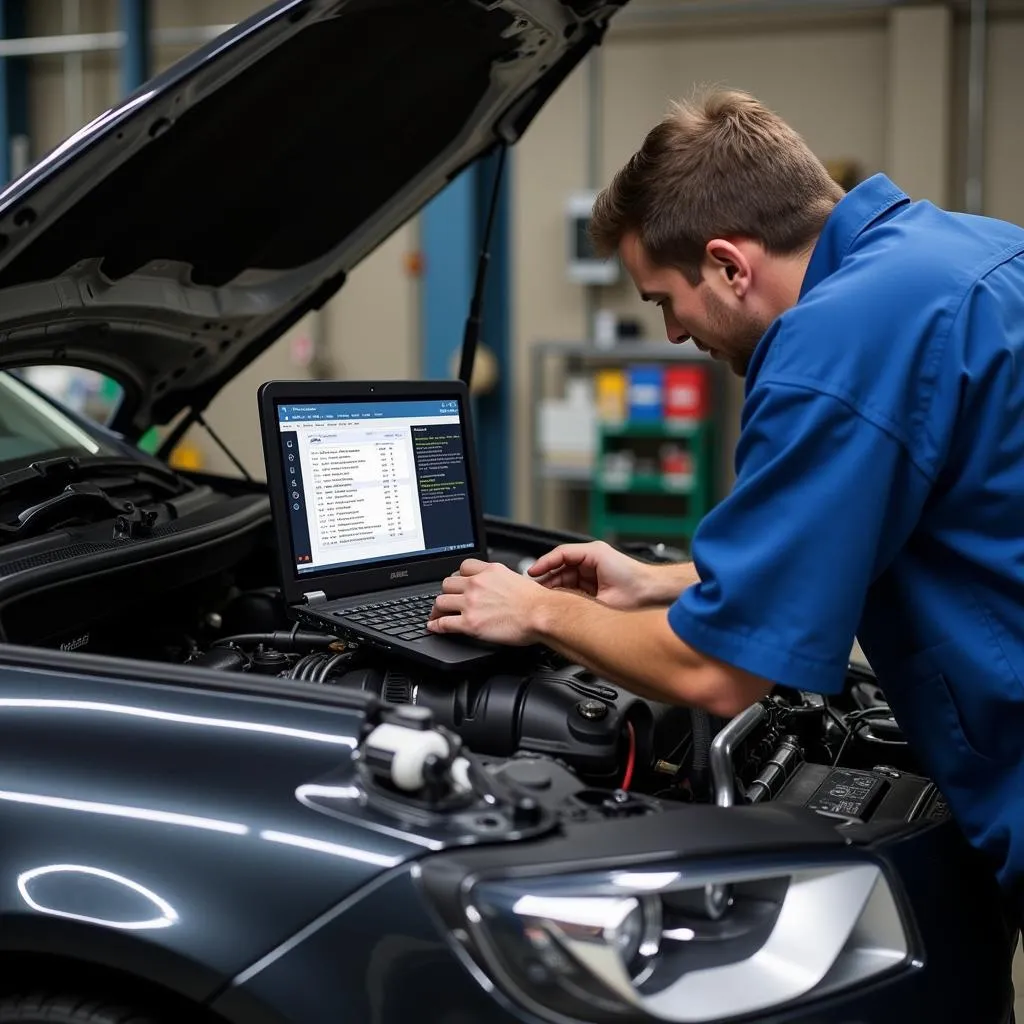Modern vehicles are technological marvels, relying heavily on sophisticated computer systems for optimal performance. Gone are the days of simple mechanical repairs; today’s automotive technicians require advanced tools to diagnose and fix complex issues. This is where automotive laptops come into play. These specialized computers act as the brains of a mechanic’s toolkit, providing access to critical vehicle data and diagnostic software.
Why Automotive Laptops Are Essential for Modern Mechanics
 Mechanic connecting automotive laptop to car's OBD-II port
Mechanic connecting automotive laptop to car's OBD-II port
Automotive laptops offer several advantages over traditional diagnostic tools. They are designed to withstand the rigors of a garage environment and provide:
- Comprehensive Diagnostics: Laptop automotive scanner can access and analyze data from various vehicle systems, including engine, transmission, ABS, airbags, and more. This allows mechanics to pinpoint problems quickly and efficiently.
- Software Updates: Unlike standalone scanners, automotive laptops can be easily updated with the latest software, ensuring compatibility with new vehicle models and diagnostic procedures.
- Advanced Functionality: Many automotive scanner software for laptops offer advanced features like live data streaming, component activation, and coding capabilities, empowering mechanics to perform complex repairs and maintenance tasks.
- Portability and Convenience: Laptops for mechanics are compact and lightweight, making them easy to transport between the workshop and the vehicle.
Choosing the Right Automotive Laptop: Key Features to Consider
Selecting the right automotive laptop is crucial for efficient diagnostics and repairs. Consider these essential factors when making your decision:
- Durability: Opt for a ruggedized laptop designed to withstand dust, moisture, vibrations, and accidental drops common in a garage environment.
- Processing Power: A fast processor and ample RAM are vital for running demanding diagnostic software smoothly.
- Display Quality: A bright, high-resolution display with good viewing angles ensures clear visibility of diagnostic data, wiring diagrams, and technical documents.
- Connectivity: Ensure the laptop has multiple USB ports, an HDMI port for external displays, and reliable Wi-Fi for software updates and internet access.
- Battery Life: A long-lasting battery is essential for extended diagnostic sessions without interruption.
Software Makes the Difference: Exploring Diagnostic Programs
While the laptop hardware is essential, the real power lies in the laptop diagnostic program it runs.
- OEM Software: Original Equipment Manufacturer (OEM) software provides comprehensive diagnostics and programming capabilities specific to a particular car brand.
- Third-Party Software: These programs offer a wider range of vehicle coverage and often come at a more affordable price point compared to OEM options.
“Selecting the right software can be just as important as choosing the laptop itself,” says John Smith, a seasoned automotive technician with over 20 years of experience. “It’s crucial to choose a program that aligns with your specific needs and the types of vehicles you work on.”
Connecting the Dots: Cables and Adapters
The OBD2 cable to laptop is the crucial link that connects the laptop to the vehicle’s On-Board Diagnostics (OBD) port, allowing communication between the two.
- Standard OBD2 Cables: Most modern vehicles use the standard 16-pin OBD2 connector.
- Adapters: Older vehicles might require specific adapters to connect to the laptop’s diagnostic software.
Conclusion
In the ever-evolving automotive landscape, staying ahead of the curve is paramount for success. Automotive laptops have become indispensable tools for mechanics, providing the diagnostic power and information access needed to tackle complex vehicle issues. By carefully considering the factors outlined above, mechanics can choose the optimal automotive laptop and software combination to elevate their diagnostic capabilities and provide top-notch service to their customers.
FAQs
What is the average cost of an automotive laptop?
The price can range widely depending on specifications and software, starting from around $500 for entry-level models to over $3,000 for high-end systems.
Can I use a regular laptop for automotive diagnostics?
While technically possible, using a regular laptop is not recommended due to potential compatibility issues, lack of ruggedness, and software limitations.
Do I need different software for different car brands?
Yes, using OEM software for each brand often provides the most comprehensive diagnostics. However, some third-party software options offer multi-brand coverage.
Have More Questions?
Need help selecting the right automotive laptop or software? Our team of experts is here to assist you. Contact us via WhatsApp at +1(641)206-8880, email us at [email protected], or visit our workshop at 276 Reock St, City of Orange, NJ 07050, United States. We’re available 24/7 to answer your questions and help you find the perfect solution for your automotive diagnostic needs.